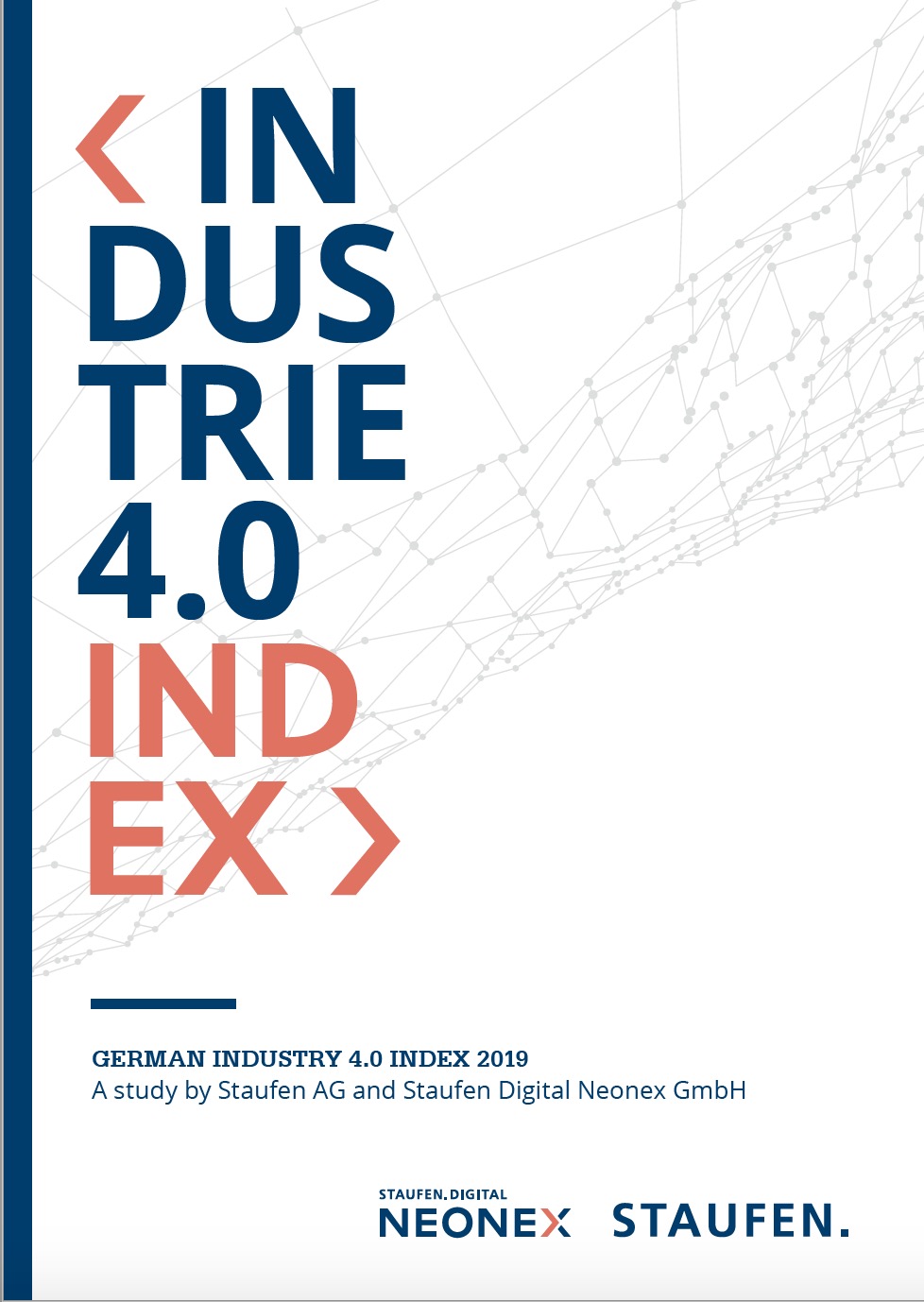Industry 4.0 Index 2019
15. November 2019- Study
- Industry 4.0

GERMANY INDUSTRY 4.0 INDEX 2019: WHEN IT COMES TO THE TOPIC OF SMART FACTORIES, MANY COMPANIES ARE SPREADING THEMSELVES THIN WITH INDIVIDUAL PROJECTS / DIGITAL BUSINESS MODELS ARE STAGNATING
The German Industry 4.0 Index, which was assessed for the sixth time, continued to rise in 2019. 56% of companies now implement Industry 4.0 on an operational level. However, when it comes to Smart Factories, few companies are able to make the leap from individual projects to cross-company implementation. Even with smart business models, digital pioneers continue to stay amongst themselves. For the German Industry 4.0 Index 2019, business consultancy Staufen together with experts from Staufen Digital Neonex surveyed more than 300 industrial companies in Germany.
Despite the enormous development since the first index survey five years ago - only 15% of companies were active in Industry 4.0 in 2014 - the bad news is that the number of companies that comprehensively implement Industry 4.0 in their operations is only very low slowly rising," says Martin Haas, CEO of Staufen AG. "Companies are predominantly optimizing within the well-established system boundaries of company divisions, thereby forgoing the potential of cross-company digitization initiatives to increase competitiveness.
The greatest advances in digitization were seen in the electronics industry: More than two-thirds of companies rely on Smart Factories. Mechanical engineering is only slightly more hesitant. At the bottom of the pile is the automotive industry, where fewer than every second company implements Industry 4.0. This figure even decreased further compared to the 2018 study. Here, the sense of crisis currently prevailing in the automotive industry also becomes evident.
As the study also shows, a majority of surveyed professionals and executives see Smart Factories as a means to cut costs. "This is surprising because most companies are even not positioned as cost leaders in the market," noted Jochen Schlick, Senior Partner at Staufen Digital Neonex. "In addition, the Smart Factory has a lasting effect on cost structures if it is implemented in a comprehensive manner. But individual projects are often a patchwork of isolated solutions. They need a clear strategy to have positive implications for their cost structures."
GERMANY INDUSTRY 4.0 INDEX 2019: WHEN IT COMES TO THE TOPIC OF SMART FACTORIES, MANY COMPANIES ARE SPREADING THEMSELVES THIN WITH INDIVIDUAL PROJECTS / DIGITAL BUSINESS MODELS ARE STAGNATING
The German Industry 4.0 Index, which was assessed for the sixth time, continued to rise in 2019. 56% of companies now implement Industry 4.0 on an operational level. However, when it comes to Smart Factories, few companies are able to make the leap from individual projects to cross-company implementation. Even with smart business models, digital pioneers continue to stay amongst themselves. For the German Industry 4.0 Index 2019, business consultancy Staufen together with experts from Staufen Digital Neonex surveyed more than 300 industrial companies in Germany.
Despite the enormous development since the first index survey five years ago - only 15% of companies were active in Industry 4.0 in 2014 - the bad news is that the number of companies that comprehensively implement Industry 4.0 in their operations is only very low slowly rising," says Martin Haas, CEO of Staufen AG. "Companies are predominantly optimizing within the well-established system boundaries of company divisions, thereby forgoing the potential of cross-company digitization initiatives to increase competitiveness.
The greatest advances in digitization were seen in the electronics industry: More than two-thirds of companies rely on Smart Factories. Mechanical engineering is only slightly more hesitant. At the bottom of the pile is the automotive industry, where fewer than every second company implements Industry 4.0. This figure even decreased further compared to the 2018 study. Here, the sense of crisis currently prevailing in the automotive industry also becomes evident.
As the study also shows, a majority of surveyed professionals and executives see Smart Factories as a means to cut costs. "This is surprising because most companies are even not positioned as cost leaders in the market," noted Jochen Schlick, Senior Partner at Staufen Digital Neonex. "In addition, the Smart Factory has a lasting effect on cost structures if it is implemented in a comprehensive manner. But individual projects are often a patchwork of isolated solutions. They need a clear strategy to have positive implications for their cost structures."
Fewer smart products and services than last year
In addition to the comprehensive implementation of a Smart Factory strategy, most companies have also come to a halt with regards to smart business. Last year's survey found that around a quarter of all companies offered digital products, services or even complete business models. This number also applies to the 2019 study. In total, the index has even slightly decreased in this area.
Across all industries, companies have fewer smart products and services in development or in customer testing," says digitalization expert Schlick. "Our study shows a rise in the number of companies that do not offer digital products or services. It is apparent that some of the new developments have failed to live up to their promises and have had to be withdrawn or redesigned.
The German Industry 4.0 Index 2019
For the "German Industry 4.0 Index 2019," business consultancy Staufen AG and Staufen Digital Neonex GmbH surveyed a total of 323 companies in Germany on the topics of Industry 4.0 and Digitization. Nearly 70% of the companies surveyed come from the mechanical and plant engineering, electrical engineering and automotive industries.


